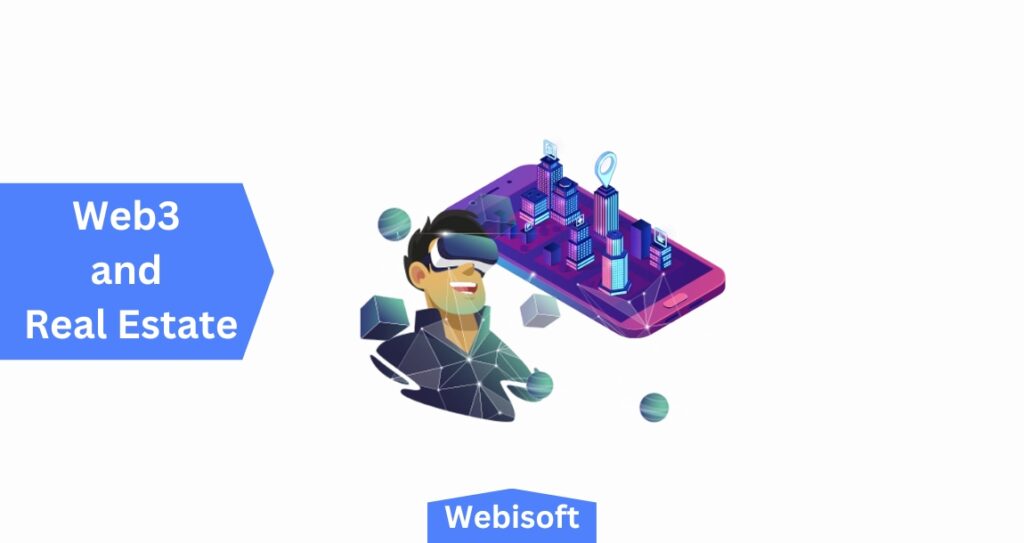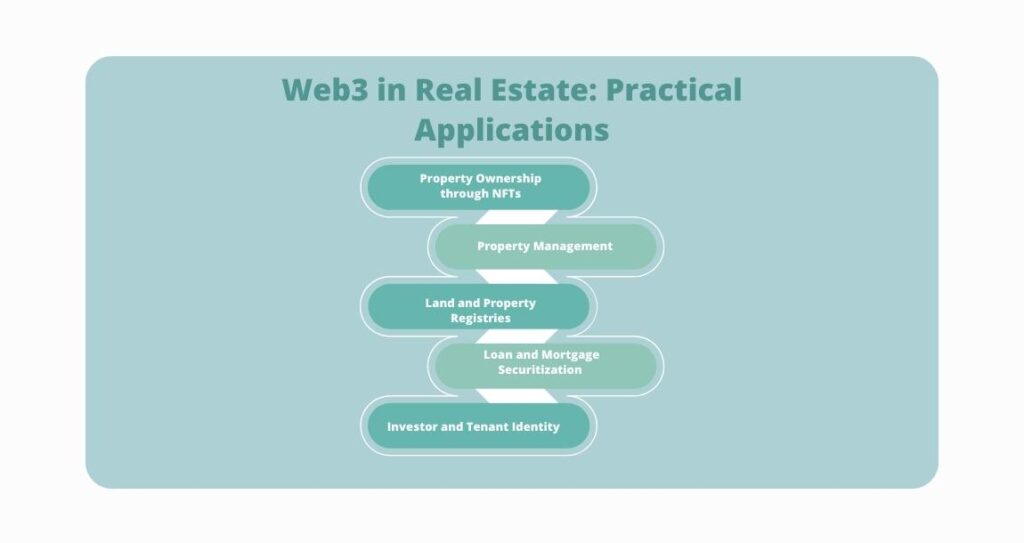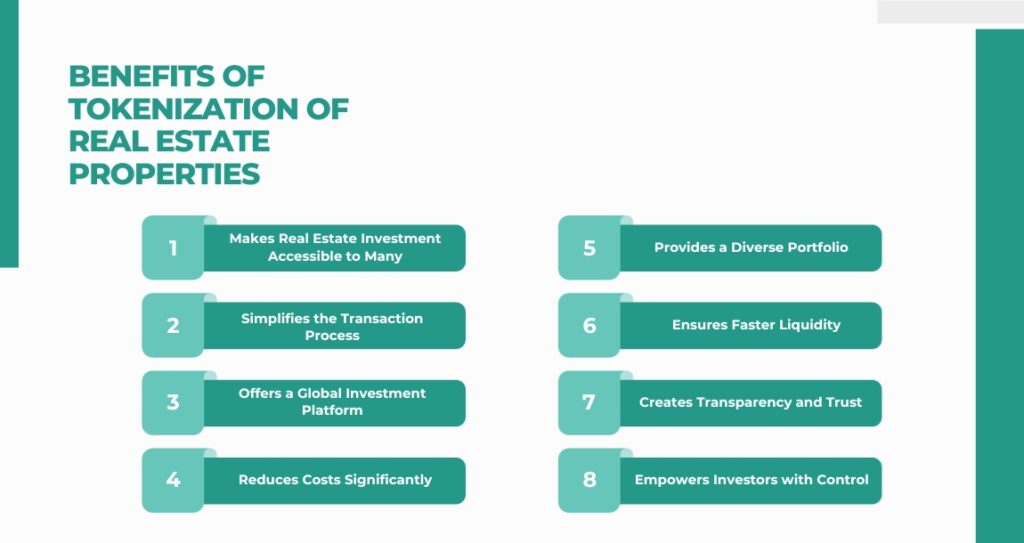Welcome to a new way of looking at homes and offices – welcome to web3 real estate. It’s like playing a video game where you can pick and buy a building with a click.
This isn’t make-believe; it’s real and happening right now. People are getting excited because it’s easy and fast. No need to wait for days or talk to lots of people just to buy a place.
Did you know that some places in the world are already selling homes this way? It’s true. One report said that over a billion dollars’ worth of property has been sold using web3. That’s a lot of houses and offices!
In the next few paragraphs, we’re going to show you how web3 real estate works. Let’s get started!
Contents
- 1 Web3 and Real Estate
- 2 How is Web3 in Real Estate a Superior Alternative?
- 3 Web3 in Real Estate: Practical Applications
- 4 Benefits of Tokenization of Real Estate Properties
- 4.1 1. Makes Real Estate Investment Accessible to Many
- 4.2 2. Simplifies the Transaction Process
- 4.3 3. Offers a Global Investment Platform
- 4.4 4. Reduces Costs Significantly
- 4.5 5. Provides a Diverse Portfolio
- 4.6 6. Ensures Faster Liquidity
- 4.7 7. Creates Transparency and Trust
- 4.8 8. Empowers Investors with Control
- 5 Use Cases of Real Estate Tokenization
- 6 Final Note
- 7 Frequently Asked Questions
Web3 and Real Estate

Web3 reshapes how we handle property, from buying a home to investing in commercial spaces. This new wave combines the internet’s vast resources with blockchain’s trustworthiness, crafting a real estate world that’s both accessible and secure.
The real estate world is catching up with the digital era. Web3 asset management, the latest internet innovation, is at the forefront, blending real estate with cutting-edge technology.
Now, managing properties and investments is as simple as a click, thanks to blockchain’s power.
How is Web3 in Real Estate a Superior Alternative?
Blockchain-based smart contracts are changing the game. Imagine sealing a deal without the worry of mishandled paperwork or fraud.
These digital contracts self-execute when conditions are met, slashing the time and stress usually involved.
Transparent and secure property listing services are another boon. With Web3, every listing is an open book, free from tampering in decentralized finance (DeFi).
This clarity builds trust among buyers, sellers, and investors, a foundation that the traditional market sometimes struggles to provide.
Accessible property investment is no longer limited to the wealthy. Web3 real estate investing democratizes the process, allowing small investors to own parts of property through tokenization. This means more people can build wealth through real estate.
Web3 in real estate also ensures:
- •Streamlined Transactions: Gone are the days of lengthy paperwork. Web3 makes buying and selling direct and efficient.
- Global Access: Borders no longer bind investors. Web3 opens the market to a global audience, inviting international investments.
- Reduced Costs: By cutting out middlemen, metaverse real estate reduces fees. This means more money stays in your pocket.
- Real-Time Updates: With blockchain, property records update in real time. No more outdated listings or missing information.
- Enhanced Liquidity: Tokenization makes it easier to sell and buy parts of properties, much like trading stocks.
Web3 is not just a tech buzzword; it’s the future of real estate. It promises a market where transparency, security, and access are not just ideals but realities.
As Web3 real estate companies embrace this technology, buying a dream home or investing in a new venture could be as straightforward as online shopping today.
Web3 in Real Estate: Practical Applications

Web3 is carving a path for a smarter, safer, and more inclusive real estate market. Embracing this digital leap could mean better opportunities for all, regardless of their location or financial status.
It’s a world where the complex becomes uncomplicated, and the once inaccessible becomes attainable.
Welcome to the era of Web3 real estate — the smart way to property ownership and investment. Web3 is changing how we buy, sell, and manage property.
Let’s walk through what this means in real estate.
Property Ownership through NFTs
NFTs, or non-fungible tokens, are like special digital stickers saying you own something. In real estate, they can represent your house or land.
When you buy property, you get an NFT that proves it’s yours. This makes buying and selling houses simpler and faster.
Property Management
Imagine controlling your property with just your phone. Web3 lets landlords collect rent, sign leases, and manage their buildings online.
No more paper forms or office visits. Tenants can pay rent or report a broken sink with a few taps.
Land and Property Registries
Keeping track of who owns what land can be tough. Web3 stores all this info safely online. Governments and buyers can easily see who owns a property. This reduces mistakes and makes buying land safer.
Loan and Mortgage Securitization
Getting a loan for a house usually means lots of checks and paperwork. With web3, all the details about your loan are online.
Banks can see if you’re good to lend to without all the hassle. This could mean quicker and possibly cheaper loans.
Investor and Tenant Identity
Web3 helps check who is renting your property or investing in your building. It keeps track of their info in a secure way. This helps landlords and investors know who they’re dealing with.
Benefits of Tokenization of Real Estate Properties

Tokenization in real estate is a process that turns property value into digital tokens, similar to cryptocurrencies.
This can transform how we invest in property. Let’s dive deeper into the benefits of tokenizing real estate assets:
1. Makes Real Estate Investment Accessible to Many
Traditionally, investing in real estate was for the wealthy. Now, tokenization divides expensive property into affordable shares.
You don’t need thousands of dollars; you can start investing with what you have. It’s like owning a small piece of a big cake.
2. Simplifies the Transaction Process
In regular real estate deals, you deal with brokers, lawyers, and banks, which takes time and paperwork. Tokenization cuts through this.
Buying tokens is as simple as online shopping. This speed and simplicity make real estate more attractive to investors.
3. Offers a Global Investment Platform
With tokenization, geographical boundaries blur. A student in Asia can invest in an apartment in New York. The global market opens up, providing a wealth of options to investors who were previously limited to local or national properties.
4. Reduces Costs Significantly
The traditional property transaction process has many hidden costs, such as commission fees, legal fees, and taxes.
Tokenization reduces these costs because it relies on blockchain technology, eliminating the need for middlemen and reducing transaction fees to a minimum.
5. Provides a Diverse Portfolio
Tokenization allows investors to spread their investments across various properties, including commercial, residential, or industrial, without the need to commit a large sum to a single property. This diversification can protect against market volatility.
6. Ensures Faster Liquidity
The real estate market is known for its illiquidity. However, real estate tokens can be traded on digital platforms, making it possible to buy or sell shares quickly. This liquidity is similar to that of stocks, making real estate investment more flexible.
7. Creates Transparency and Trust
Blockchain, the technology behind tokenization, provides a transparent and secure ledger of transactions.
Each token contains information about the property and its ownership. This transparency builds trust among investors and reduces the potential for fraud.
8. Empowers Investors with Control
Investors have complete control over their tokens. They can choose to hold them, sell them, or use them as collateral for loans.
This flexibility is empowering, especially compared to the cumbersome process of selling actual real estate.
Tokenization is revolutionizing the real estate industry by making it more democratic, cost-effective, and efficient.
As it gains popularity, it could very well become the new standard for property investment, offering a modern solution to an age-old market.
Use Cases of Real Estate Tokenization
Real estate tokenization is reshaping property investment. Let’s explore its use cases and the concept of virtual real estate.
Fractionalized Investment
Owning a slice of prime property becomes possible with fractionalized investment. Investors buy tokens representing a fraction of the property’s value. Even small investors can now access high-value assets tokenization.
The entry barrier lowers, welcoming a diverse group of investors. These tokens reflect a direct stake in the property’s revenue or sale proceeds. Everyone can invest in high-grade real estate, once out of reach.
Trading Tokens on Exchanges
Tokenized property can be traded like stocks. Investors sell their tokens on exchanges. This adds liquidity to a traditionally illiquid market. The process is swift, bypassing the long sales cycles of physical properties.
Trading becomes less costly and more accessible. Investors have the freedom to trade as they do with shares, making real estate a more flexible asset class.
Virtual Real Estate
The digital world offers virtual real estate opportunities. Platforms allow users to buy, sell, or develop virtual land. This land exists in online environments, like video games or virtual worlds.
The concept might sound futuristic, but it’s already in action. Virtual real estate has value, akin to physical land. It’s a new frontier for investors and developers.
They can create experiences, host events, or advertise, all in the digital realm.
Tokenization and virtual real estate are at the forefront of innovation in the property sector. They provide inclusivity, liquidity, and novel opportunities, revolutionizing how we view and invest in real estate.
Final Note
Web3 real estate is stepping into the future, leaving behind the days of endless paperwork and confusing processes. It’s like having a magic key to unlock any property door, anywhere, anytime.
This is no ordinary key; it’s digital, it’s secure, and it’s revolutionizing how we buy and sell places. People love web3 real estate because it’s all about making things easy.
Imagine buying a house the same way you shop online for shoes. That’s the kind of simplicity we’re talking about.
Plus, with everything online, you can say goodbye to the extra costs that come with traditional reality. Curious about how web3 will change your home-buying experience?
Stay with us, and let’s explore this digital property journey together. And if you’re ready to leap into the future now, Webisoft can guide you there. Click to learn more and join the revolution!
Frequently Asked Questions
Will Web3 real estate eliminate the need for real estate agents?
Not entirely. Agents may still provide valuable insights and services, but their role could shift towards advising in a more technologically driven market.
How does Web3 impact real estate investing?
Web3 opens up global investment opportunities, lowers entry barriers, and enables fractional ownership, making it easier to invest in real estate.
What are the benefits of using Web3 for real estate?
Benefits include enhanced security, improved efficiency, reduced transaction costs, and the potential for a more liquid real estate market.
Are there any Web3 real estate platforms available now?
Yes, several platforms are offering Web3 real estate services, from listings to tokenization and sales.
How can I get started with investing in Web3 real estate?
Begin by researching Web3 real estate platforms, understanding blockchain technology, and considering speaking with a financial advisor knowledgeable in cryptocurrency and digital assets.
